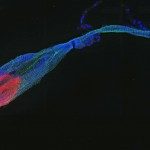Lien vers Pubmed [PMID] – 18395207
Int. J. Parasitol. 2008 Aug;38(10):1099-109
The human malaria parasite Plasmodium falciparum utilises a mechanism of antigenic variation to avoid the antibody response of its human host and thereby generates a long-term, persistent infection. This process predominantly results from systematic changes in expression of the primary erythrocyte surface antigen, a parasite-produced protein called PfEMP1 that is encoded by a repertoire of over 60 var genes in the P. falciparum genome. var genes exhibit extensive sequence diversity, both within a single parasite’s genome as well as between different parasite isolates, and thus provide a large repertoire of antigenic determinants to be alternately displayed over the course of an infection. Whilst significant work has recently been published documenting the extreme level of diversity displayed by var genes found in natural parasite populations, little work has been done regarding the mechanisms that lead to sequence diversification and heterogeneity within var genes. In the course of producing transgenic lines from the original NF54 parasite isolate, we cloned and characterised a parasite line, termed E5, which is closely related to but distinct from 3D7, the parasite used for the P. falciparum genome nucleotide sequencing project. Analysis of the E5 var gene repertoire, as well as that of the surrounding rif and stevor multi-copy gene families, identified examples of frequent recombination events within these gene families, including an example of a duplicative transposition which indicates that recombination events play a significant role in the generation of diversity within the antigen encoding genes of P. falciparum.

